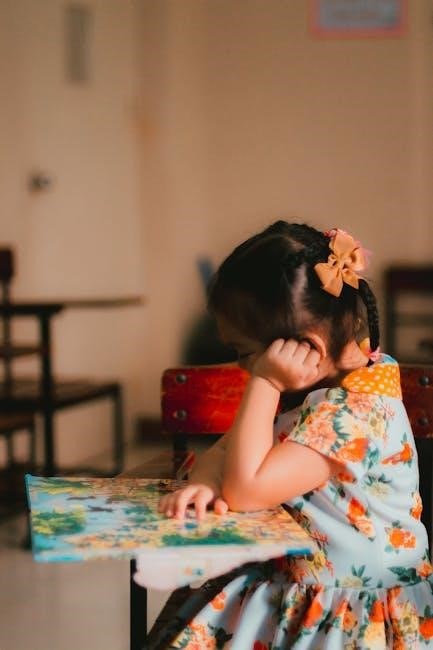kindergarten readiness checklist pdf
Kindergarten readiness ensures children are prepared for academic and social success. A checklist helps assess skills like language, motor abilities, and emotional development, guiding parents and educators effectively.
1.1 Understanding the Importance of Kindergarten Readiness
Kindergarten readiness is crucial as it lays the foundation for future academic success. It ensures children possess essential skills like social, emotional, and cognitive development. Checklists help identify gaps, allowing early intervention. These tools guide parents and educators in fostering a smooth transition to formal education, promoting a lifelong love for learning and adaptability in school environments.
1.2 Purpose of a Kindergarten Readiness Checklist
A kindergarten readiness checklist is designed to assess a child’s preparedness for school. It evaluates skills like language, motor abilities, and emotional development. The checklist helps parents and educators identify gaps, guide preparation, and ensure a smooth transition. It is not a tool for enrollment decisions but a resource to foster readiness and confidence in young learners effectively.
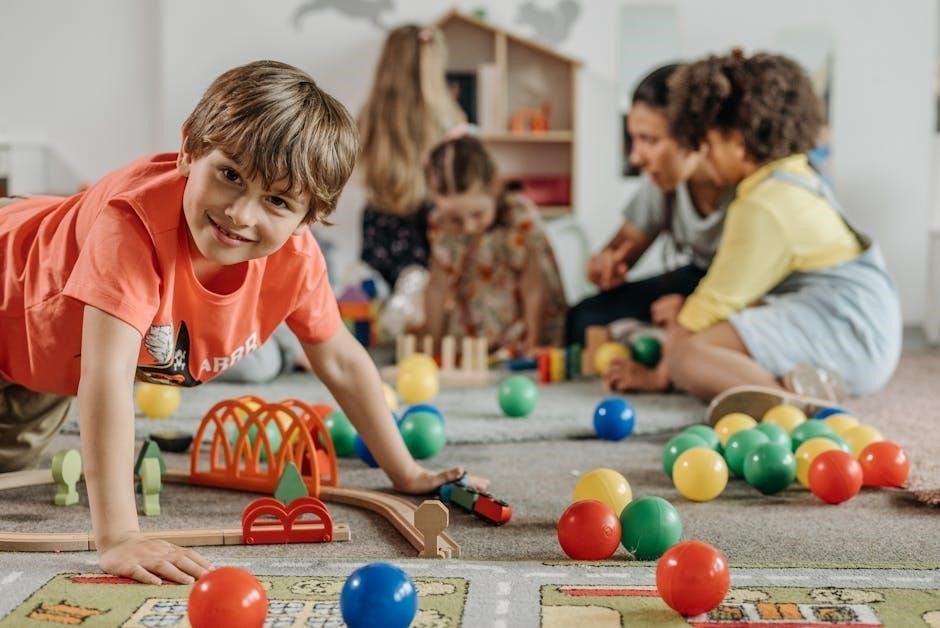
Social-Emotional Skills
Social-emotional skills are crucial for kindergarten readiness, enabling children to interact positively, share, cooperate, and manage emotions effectively, as outlined in readiness checklists.
2.1 Cooperation and Sharing
Cooperation and sharing are key social skills for kindergarten readiness. Checklists emphasize the ability to take turns, work in groups, and show respect for others’ belongings, fostering a collaborative classroom environment.
2.2 Communication Skills
Effective communication skills are vital for kindergarten success. Checklists highlight the ability to express thoughts clearly, engage in conversations, and listen actively, ensuring children can convey their needs and collaborate with peers confidently.
2;3 Friendship Skills
Friendship skills foster social connections in kindergarten. A readiness checklist evaluates cooperation, sharing, and empathy, helping children build positive relationships and work collaboratively, essential for a supportive classroom environment and emotional growth.
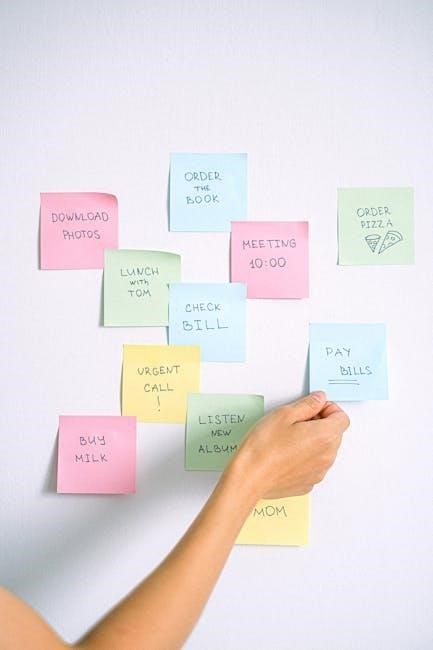
Emotional Readiness
Emotional readiness involves self-awareness, emotional regulation, and confidence. A checklist helps identify if a child can manage feelings, show empathy, and demonstrate independence, crucial for kindergarten success.
3.1 Self-Awareness
Self-awareness is recognizing one’s emotions, strengths, and needs. A kindergarten readiness checklist assesses if children can identify their feelings, express personal preferences, and demonstrate an understanding of their individuality. This skill is foundational for social interactions and emotional growth in a classroom environment, fostering confidence and independence from an early age.
3.2 Emotional Regulation
Emotional regulation involves managing feelings like anger or excitement. A readiness checklist evaluates a child’s ability to calm down, focus, and handle frustrations appropriately. These skills are crucial for classroom behavior, helping children adapt to new environments and build positive relationships with peers and teachers, promoting a stable emotional foundation for learning and growth.
3.3 Confidence and Independence
Confidence and independence are key for kindergarten success. A readiness checklist assesses if a child can perform tasks independently, like using the bathroom or dressing, and demonstrates self-assurance in new situations. These skills help children explore their environment, solve problems, and interact confidently with others, fostering a positive start to their educational journey.
Physical Development
Physical development includes fine and gross motor skills, essential for kindergarten readiness. These abilities enable children to perform tasks like drawing, using scissors, and engaging in active play effectively.
4.1 Fine Motor Skills
Fine motor skills involve precise movements like using utensils, drawing, and buttoning shirts. Developing these abilities is crucial for tasks such as writing, cutting with scissors, and handling small objects, laying the foundation for academic success in kindergarten.
4.2 Gross Motor Skills
Gross motor skills involve large muscle groups, enabling activities like running, jumping, and balancing. These abilities are essential for playground interactions and physical confidence. A readiness checklist often includes assessments of coordination, stamina, and overall physical readiness for active participation in a kindergarten environment.
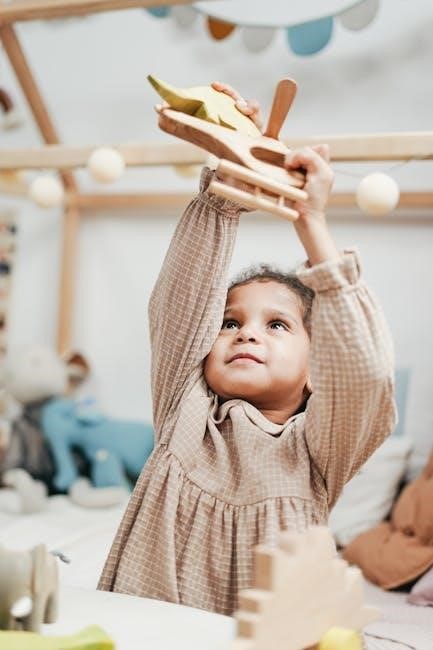
Cognitive Skills
Cognitive skills include problem-solving, memory, and understanding cause-effect relationships. These abilities help children grasp basic math concepts and think critically, forming a strong foundation for future learning.
5.1 Problem-Solving Abilities
Problem-solving abilities are crucial for kindergarten readiness. Children should demonstrate skills like identifying problems, using logic, and thinking creatively. These skills help with academic challenges and everyday situations, fostering independence and critical thinking. Checklists often include tasks like sorting objects or completing puzzles to assess these abilities effectively.
5.2 Basic Literacy Skills
Basic literacy skills form the foundation of kindergarten readiness. Children should recognize letters, understand sounds, and demonstrate an awareness of print. Checklists often include tasks like identifying uppercase and lowercase letters and showing an interest in reading. These skills are essential for early reading development and future academic success.
5.3 Numeracy Basics
Numeracy basics are fundamental for kindergarten readiness. Skills include recognizing numbers up to 10, counting up to 20, and understanding number sequences. Children should also demonstrate an ability to connect numbers to quantities and show awareness of basic addition and subtraction concepts. These foundational math skills are crucial for early numeracy development and future academic success.
Self-Help Skills
Self-help skills are essential for kindergarten readiness. These include using the bathroom independently, dressing, and completing simple hygiene tasks, fostering independence and confidence in daily routines.
6.1 Using the Bathroom Independently
Using the bathroom independently is a critical self-help skill for kindergarten readiness. This includes demonstrating the ability to locate the bathroom, manage clothing, and complete hygiene tasks without assistance, promoting self-reliance and reducing the need for adult support during school hours.
6.2 Dressing and Undressing
Dressing and undressing independently is a key self-help skill for kindergarten readiness. This includes efficiently putting on and taking off clothes, shoes, and accessories. Mastery of this skill fosters confidence and reduces reliance on teachers, allowing children to participate fully in daily activities and transitions, such as preparing for outdoor play or using the restroom.
6.3 Completing Simple Hygiene Tasks
Mastering simple hygiene tasks is essential for kindergarten readiness. This includes washing hands properly, using tissues, and covering coughs. These skills promote health and independence, allowing children to navigate the classroom environment confidently while maintaining personal cleanliness and contributing to a hygienic community within the school setting.
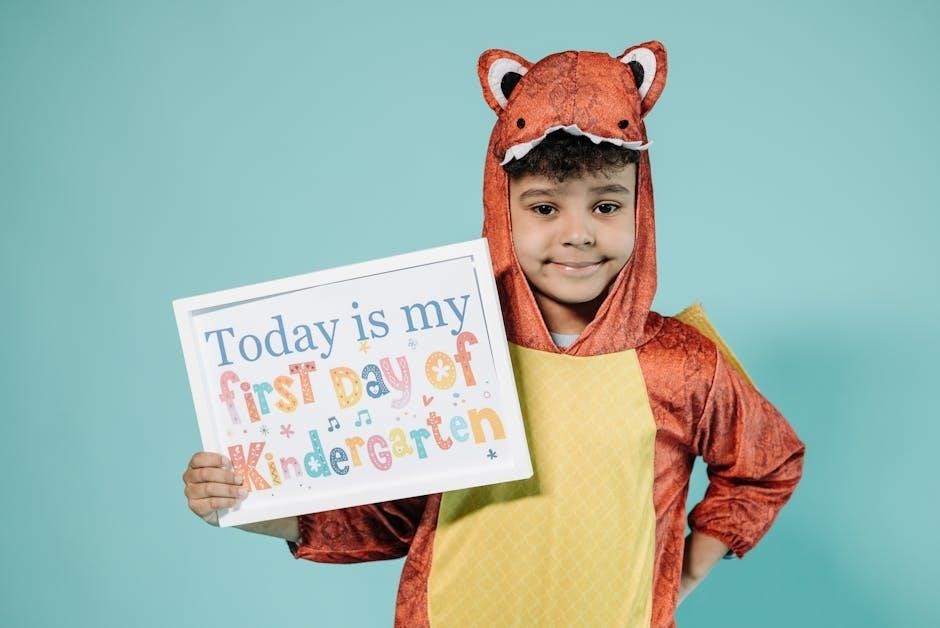
Language Skills
Language skills are crucial for kindergarten success. This includes talking in sentences, understanding instructions, and identifying basic sight words, fostering effective communication and early literacy development.
7.1 Vocabulary Development
Vocabulary development is essential for kindergarten readiness. It involves identifying and naming objects, understanding basic verbs, and recognizing common sight words. Expanding a child’s vocabulary enhances their communication skills and prepares them for early literacy. Engaging in conversations and reading books together can significantly strengthen this skill, laying a strong foundation for future academic success.
7.2 Sentence Structure and Grammar
Mastering basic sentence structure and grammar is vital for kindergarten readiness. Children should demonstrate an understanding of simple sentences, proper word order, and basic punctuation. They should also identify parts of speech, such as nouns and verbs, and use pronouns correctly. Practice through storytelling and interactive activities helps build these foundational language skills effectively and engagingly.
7.3 Listening Comprehension
Strong listening comprehension skills are essential for kindergarten success. Children should understand and follow simple instructions, recall details from stories, and engage in conversations. Activities like listening to books and answering questions enhance their ability to process information and respond appropriately, fostering a solid foundation for learning and communication in a classroom environment effectively.
Academic Preparation
Academic preparation involves exposing children to shapes, colors, and basic math concepts. These foundational skills help build a strong base for future learning and school success.
8.1 Exposure to Shapes and Colors
Recognizing shapes and colors is a key part of early learning. It enhances visual perception and lays the groundwork for math and art skills. Introducing basic shapes like squares, circles, and triangles, along with primary colors, helps children develop cognitive abilities and creativity, making it easier to grasp more complex concepts later on.
8.2 Letter Recognition
Letter recognition is a fundamental skill for early literacy. It involves identifying uppercase and lowercase letters, understanding their sounds, and distinguishing letters from shapes or numbers. This skill builds the foundation for reading and writing, enabling children to decode words and spell simple texts confidently as they progress through kindergarten.
8.3 Basic Math Concepts
Understanding basic math concepts is crucial for kindergarten readiness. These include counting up to 20, recognizing numbers 1-10, and identifying shapes and colors. Simple addition and subtraction using objects, along with sequencing and sorting, help develop problem-solving skills and prepare children for more complex mathematical tasks in the future.
Social-Emotional Learning
Social-emotional learning fosters essential life skills, including responsibility, empathy, and self-awareness. It encourages curiosity and a love for learning, preparing children for future successes.
9;1 Responsibility and Accountability
Teaching responsibility helps children understand accountability for their actions. This includes completing tasks, caring for materials, and respecting rules. It builds a sense of ownership and reliability, essential for academic and social growth.
9.2 Empathy and Understanding Others
Empathy is crucial for social harmony. Children should learn to recognize and respect others’ feelings, fostering kindness and cooperation. Understanding diverse perspectives helps build strong relationships and fosters a supportive classroom environment, promoting emotional well-being and inclusive interactions.
9.3 Curiosity and Love for Learning
Cultivating curiosity and a love for learning is essential for academic success. Encouraging children to explore, ask questions, and seek answers fosters a growth mindset. This intrinsic motivation helps them embrace challenges, view failures as learning opportunities, and develop a lifelong passion for knowledge and discovery in all areas of life.
Family and Community Involvement
Active family participation and community support are vital for a child’s development. Engaging in educational activities and utilizing local resources fosters a collaborative environment for growth and success.
10.1 Parental Support and Involvement
Parental support is crucial for kindergarten readiness. Parents play a key role in fostering skills like language, emotional regulation, and independence. Regular involvement enhances a child’s ability to adapt to school routines, ensuring a smooth transition and fostering academic success.
10.2 Understanding Community Resources
Understanding community resources helps parents access programs that promote kindergarten readiness. Libraries, local workshops, and educational websites provide tools for skill development. Engaging with these resources fosters a supportive environment, ensuring children are well-prepared for their academic journey and social growth.
11.1 Summary of Key Points
A kindergarten readiness checklist covers essential skills like communication, fine motor abilities, and problem-solving. It also includes self-help tasks and emotional readiness. These tools help parents and educators assess a child’s preparedness for school, ensuring they thrive academically and socially. Regular use of such checklists supports a smooth transition to kindergarten, fostering confidence and independence in young learners.
11.2 Accessing Printable Checklists and Workbooks
Printable kindergarten readiness checklists and workbooks are available online, offering tools for assessing and enhancing skills. Resources like the Kindergarten-Writing-Skills-Workbook.pdf and Kindergarten-Reading-Essentials-Workbook.pdf provide structured activities. Websites such as www.ErieTogether.org and school district portals offer free downloads, helping families prepare children effectively for school entry.
